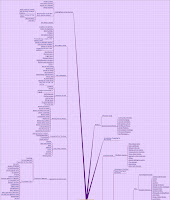In the memo, Christopher Vogler interpreted Joseph Cambpell's "The Hero with a Thousand Faces", the book in which "Campbell explores the theory that important myths from around the world which have survived for thousands of years all share a fundamental structure, which Campbell called the monomyth."
Vogler simplifies Campbell's more scholarly work into a practical handbook for writers. In a new preface to the second edition he answers critics who called The Hero's Journey formularic by saying it is a form, not a forumula. He goes on to make some interesting contextual points about its reception in "herophobic" cultures such as Australia and Germany. "Australians," he says, "distrust appeals to heroic virtue because such concepts have been used to lure generations of young Australian males into fighting Britain's battles..." while "...the legacy of Hitler and the Nazis has tainted the concept... distorted the powerful symbols to enslave, dehumanize and destroy."
A new section looking at several modern films in heroic context includes "Titanic", "The Full Monty" and oddly "Pulp Fiction". The latter doesn't naturally fit the form, so instead it's used to view the individual journeys of the three characters Jules, Vincent and Butch.


